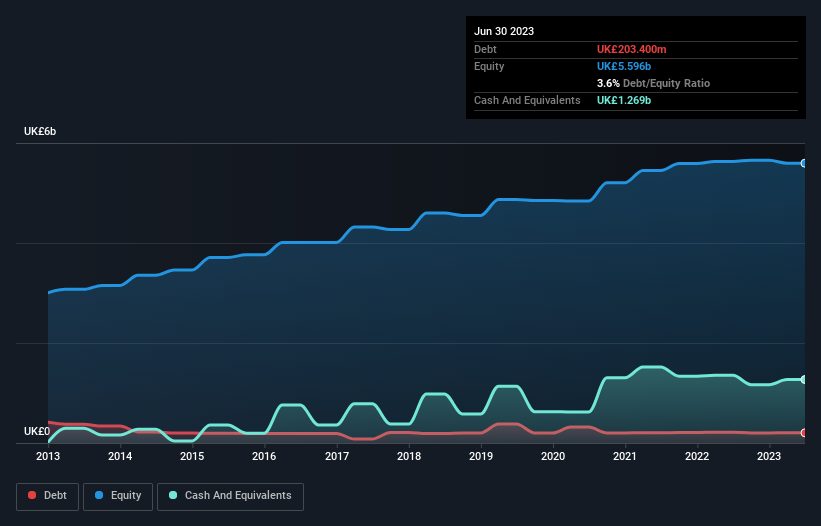- United Kingdom
- /
- Consumer Durables
- /
- LSE:BTRW
Does Barratt Developments (LON:BDEV) Have A Healthy Balance Sheet?

David Iben put it well when he said, 'Volatility is not a risk we care about. What we care about is avoiding the permanent loss of capital.' So it might be obvious that you need to consider debt, when you think about how risky any given stock is, because too much debt can sink a company. Importantly, Barratt Developments plc (LON:BDEV) does carry debt. But is this debt a concern to shareholders?
What Risk Does Debt Bring?
Debt assists a business until the business has trouble paying it off, either with new capital or with free cash flow. Part and parcel of capitalism is the process of 'creative destruction' where failed businesses are mercilessly liquidated by their bankers. However, a more frequent (but still costly) occurrence is where a company must issue shares at bargain-basement prices, permanently diluting shareholders, just to shore up its balance sheet. Of course, plenty of companies use debt to fund growth, without any negative consequences. When we think about a company's use of debt, we first look at cash and debt together.
Check out our latest analysis for Barratt Developments
What Is Barratt Developments's Debt?
The image below, which you can click on for greater detail, shows that Barratt Developments had debt of UK£203.4m at the end of June 2023, a reduction from UK£217.3m over a year. However, its balance sheet shows it holds UK£1.27b in cash, so it actually has UK£1.07b net cash.

A Look At Barratt Developments' Liabilities
We can see from the most recent balance sheet that Barratt Developments had liabilities of UK£1.45b falling due within a year, and liabilities of UK£953.2m due beyond that. On the other hand, it had cash of UK£1.27b and UK£196.6m worth of receivables due within a year. So its liabilities total UK£941.9m more than the combination of its cash and short-term receivables.
Barratt Developments has a market capitalization of UK£4.31b, so it could very likely raise cash to ameliorate its balance sheet, if the need arose. But we definitely want to keep our eyes open to indications that its debt is bringing too much risk. While it does have liabilities worth noting, Barratt Developments also has more cash than debt, so we're pretty confident it can manage its debt safely.
On the other hand, Barratt Developments's EBIT dived 18%, over the last year. We think hat kind of performance, if repeated frequently, could well lead to difficulties for the stock. When analysing debt levels, the balance sheet is the obvious place to start. But ultimately the future profitability of the business will decide if Barratt Developments can strengthen its balance sheet over time. So if you want to see what the professionals think, you might find this free report on analyst profit forecasts to be interesting.
But our final consideration is also important, because a company cannot pay debt with paper profits; it needs cold hard cash. While Barratt Developments has net cash on its balance sheet, it's still worth taking a look at its ability to convert earnings before interest and tax (EBIT) to free cash flow, to help us understand how quickly it is building (or eroding) that cash balance. During the last three years, Barratt Developments produced sturdy free cash flow equating to 67% of its EBIT, about what we'd expect. This cold hard cash means it can reduce its debt when it wants to.
Summing Up
While Barratt Developments does have more liabilities than liquid assets, it also has net cash of UK£1.07b. And it impressed us with free cash flow of UK£442m, being 67% of its EBIT. So we don't have any problem with Barratt Developments's use of debt. When analysing debt levels, the balance sheet is the obvious place to start. However, not all investment risk resides within the balance sheet - far from it. These risks can be hard to spot. Every company has them, and we've spotted 2 warning signs for Barratt Developments (of which 1 doesn't sit too well with us!) you should know about.
If you're interested in investing in businesses that can grow profits without the burden of debt, then check out this free list of growing businesses that have net cash on the balance sheet.
Valuation is complex, but we're here to simplify it.
Discover if Barratt Redrow might be undervalued or overvalued with our detailed analysis, featuring fair value estimates, potential risks, dividends, insider trades, and its financial condition.
Access Free AnalysisHave feedback on this article? Concerned about the content? Get in touch with us directly. Alternatively, email editorial-team (at) simplywallst.com.
This article by Simply Wall St is general in nature. We provide commentary based on historical data and analyst forecasts only using an unbiased methodology and our articles are not intended to be financial advice. It does not constitute a recommendation to buy or sell any stock, and does not take account of your objectives, or your financial situation. We aim to bring you long-term focused analysis driven by fundamental data. Note that our analysis may not factor in the latest price-sensitive company announcements or qualitative material. Simply Wall St has no position in any stocks mentioned.
About LSE:BTRW
Barratt Redrow
Engages in the housebuilding business in the United Kingdom.
Excellent balance sheet with reasonable growth potential.
Similar Companies
Market Insights
Community Narratives



